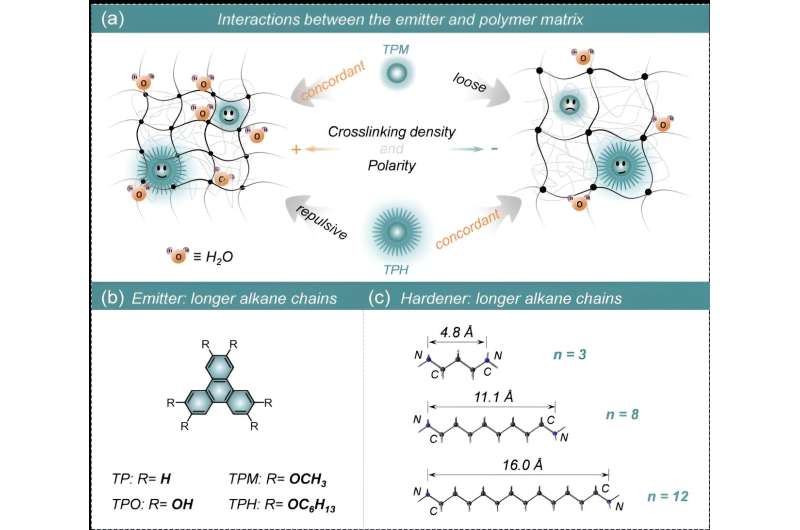
Ultralong organic phosphorescence
(UOP) materials can be applied in fields such as displays, sensing, information
encryption, bioimaging. Among these, polymeric UOPs have attracted much
attention due to good film-forming stability, cost-effectiveness, and
suitability for large-scale production. However, achieving good
water/moisture-resistance for long-term environmental stability remains a
challenge.
A research team led by Prof. Zhu Pengli from the Shenzhen Institute of Advanced Technology (SIAT) of the Chinese Academy of Sciences and Prof. Chi Zhenguo from the Sun Yat-sen University has proposed a new strategy to enhance the long-term stability of UOP materials based on epoxy resin in high-temperature-humidity conditions via hydrophobic effect.
The study was published in Aggregate on Oct. 10.
The researchers obtained a series of polymeric UOPs based on the epoxy resin (EP) curing system with the introduction of different alkyl-chain length to the hardeners and emitters. These polymeric UOPs exhibited significant hydrophobic effect.
EP is a kind of covalent cross-linked polymeric material featured with excellent physical, mechanical, and insulation properties. The cross-linked network of epoxy is easily modulated by formulations, which has been applied as multifunctional polymers.
The researchers found that no obvious decrease in UOP emission was observed after high temperature-humidity test (85°C/85% relative humidity) for seven days.
Rigid covalent crosslinking networks suppressed the quenching of triplet excitons while the hydrophobic microenvironment afforded good water/moisture-resistance ability for the polymeric UOPs.
"These polymers are featured with outstanding environmental stability, processability, and adhesive properties. They can be applied in various fields, including films coating (on different substrates), prepreg for glass fibers and thread, and optical packaging," said Prof. Zhu.

 Previous page
Previous page Back to top
Back to top







